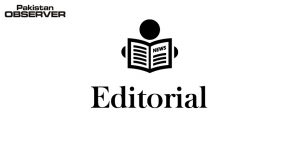THE Cabinet has reportedly accorded approval to a presidential ordinance to amend the Prevention of Electronic Crimes Act 2016, under which defaming individuals on social media has been declared a punishable offence and courts will be obliged to give verdict on such cases within six months.
Because of the Internet, the power to publish, which was once the preserve of a few, is now a commonplace.
Social media sites indeed have played an important part in empowering ordinary citizens but this paradigm shift that has made everybody a broadcaster, has also increased the risk of defamation for users without even being aware of it.
Hence, in our view, formulation of necessary laws was need of the hour to discourage people from engaging themselves in such posts which amount to insulting dignity of others.
The government also made several attempts in the past to regulate online content through legislation such as the Citizens Protection Rules-2020 and the Removal and Blocking of Unlawful Online Content (Procedure, Oversight and Safeguards) Rules-2020.
However, digital rights groups and journalist bodies such as the Reporters Without Borders (RSF) opposed the move, asserting that such measures should not become ‘a disguised form of censorship’ and demanded the government rescind the social media rules.
Indeed there should not be any curbs on freedom of expression but this freedom also needs to be exercised with responsibility.
Nobody could be allowed to insult others or hurt their sentiments.Given the fact that damage from social media defamation can be higher since the medium is instantaneous, viral, and more potent than traditional media, there is nothing wrong regulating the online content.
However it must also be seen and ensured that these laws are not abused or misused to target or punish opponents, as may be a possibility especially in our country where polarisation is on the rise.
At the same time, there is also need to further strengthen Pakistan Telecommunication Authority (PTA) so that any new viral content could be temporarily suspended whilst it is fact-checked.
Any misinformation or hate content should not be allowed permeate on the web.Separately, the government has also amended the Election Commission of Pakistan’s code of conduct paving the way for elected representatives to run election campaigns of their favourite candidates in the country.
This should have been done much earlier by political parties as the Prime Minister, Ministers or other elected representatives are political figures and stopping them from portraying their performance to public during any election campaign amounts to making mockery of democracy.
Such unrealistic election codes exist nowhere except in Pakistan and the government has done the right thing by doing away with this and we will suggest it to also get the amendment passed from Parliament after consultations with all opposition parties.
There should also be a provision, barring the elected representatives from using government machinery or money while running the election campaign either in the by-elections or upcoming local government elections.
Similarly, it must also be ensured that candidates do not exceed the expenditure limit set by the ECP for elections campaign.










